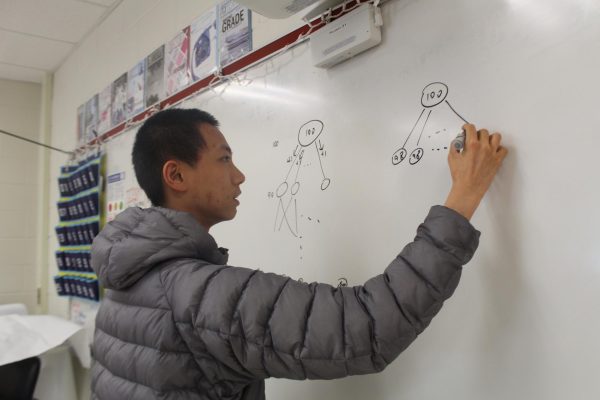International Math Olympiad (IMO) is a prestigious international math competition with several rounds to qualify. For the first time in over ten years, a student from Jefferson, junior Calvin Wang, made it into IMO, where he and five other students who qualified for the U.S. national team will compete against students from around the world in Australia in July.
In order for students to make it to the international level, students must go through a long contest series, which begins with the American Mathematics Competitions (AMC) test, which is offered in the fall at Jefferson. Then, students must take the American Invitational Mathematics Examination (AIME), which students must be invited to participate in based on their AMC score. After taking the AIME, students receive an index score that takes into account the AMC score and AIME score. Based on this index score, students can qualify for the U.S. Math Olympiad (USAMO).
“[The USAMO] is two days’ worth of proofs, and [students] get four and a half hours each day to write proofs,” math teacher and Varsity Math Team (VMT) coach Marianne Razzino said. “From there, they [can] be invited to the camp, and those people are referred to as moppers, because it is the math olympiad preparation camp. The team [for IMO] is [determined] there; then, they go to compete for the U.S. against teams from other countries at IMO.”
Wang, who received a perfect score on USAMO, attended the camp last June. The camp involves three more competitions to narrow down the number of students to around 30, and an additional six contests to determine the final six students who will be representing the U.S. at IMO.
“It was very fun,” Wang said. “It was three weeks, there were definitely a lot of classes [and] a lot of tests, but it was the free time [and] the social time that was the interesting part of the camp.”
It’s as easy as pi

While all of these competitions take great amounts of hard work and dedication, for Wang, the preparation that went into the competition was pure fun. As somebody who does math in his free time, he was able to prepare by doing what he enjoys.
“I just kept doing math, because I like math,” Wang said. “It’s just [that] another year of experience means another year of doing better and learning. [Math] has always just been for fun. I remember at one point, watching math videos was my form of entertainment.”
For students like Wang who enjoy working on competition math problems, which are different from problems in math class due to their flexibility in solutions, they must dedicate more time outside of the classroom to do math.
“Doing a math problem [usually] means I am working on it, [but] when you do math, you are not always [solving] a problem,” Wang said. “You might be thinking about different problems [and] how they connect to each other, or thinking about what the underlying concept behind [a problem] or what made the problem difficult. Maybe even writing a problem myself.”
Raising the bar
As Wang must put in a lot of effort into math in order to be successful in competitions, rather than seeing math as a chore, he finds joy in between the numbers.
“Math is such a big part of my identity and what makes me happy,” Wang said. “[For] one or two days, I tried not to do math because I didn’t want to burn out the days before [a math olympiad]. I was forcing myself not to do math, and it felt really terrible. It felt like I was losing part of my identity, and I was really bored. In the end, I got through the actual competition, so I had a lot of fun, but in general, I don’t think I can stop doing math. I would struggle a lot mentally if I did.”
With IMO happening in Australia, Wang will be with his five other teammates to represent the U.S. Though it is rigorous, it is a fun opportunity for students who love math and being exposed to these kinds of difficult problems.
“I’m not going to do anything special, I’m just going to keep doing math,” Wang said. “We’re going to meet the competitors for a few days and then take the test. I’m going to meet a lot of people, international students from other countries that I have not met before, so that will be fun. It’s a math event for a week, you are meeting a lot of people who are similar to you. I will be with the U.S. team for most of the time, which means that [they are] five people whom I know quite well. It’s like hanging out with friends, but you also get to do cool problems.”


![At the 2022 Raytheon Technologies MATHCOUNTS National Competition, junior Calvin Wang poses with his award. Wang, having started competing in math competitions from a young age, ultimately placed second at the live competition in eighth grade. “Iin kindergarten, [one of my] teachers managed to stop stop me from crying by giving me a math problem,” Wang said. “But the first time I was seriously involved in competitions was in third grade.”](https://www.tjtoday.org/wp-content/uploads/2025/07/7e30292d-51e6-42c9-920b-75cdd3cd813b-1200x900.jpeg)